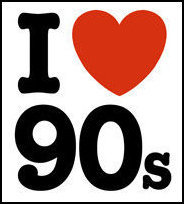I trust few enough of you have trudged through the extensive backlogs that this is almost like new. Almost. I should be back in full force by next week. Until then, enjoy the reruns! Hey, it's summertime. I've got to save the good stuff for sweeps. Thanks for your understanding--see you next week!
That's right, we're talking Nickelodeon original-Nicktoon era, not the shoddy subpar imitation churned out by ABC/Disney after 1996. To embarrass themselves further, Disney awkwardly renamed the series Brand Spanking New! Doug, despite the fact that the show had already been airing on Nickelodeon 5 years. Their new title reeked of desperation, a sort of "look at us! We got that show you liked! Now watch us make it terrible."
Exhibit A, the more wisely re-renamed Disney's Doug:
Note the presence of unmatchable Disney inoffensive blandness, replacing the original lovability of the a-cappella theme song. Whistling? Really? And everyone standing there waving cheerily? A travesty indeed.
And before we move on, let us briefly discuss the mutual ridiculosity of fanatical fan Wikipedia updaters and absurdly miniscule visual changes made by the Disney animators to classify the show as "brand-spanking new!":
Character changes on Disney's Doug:
- Doug's sleeves were longer and had a pair of black and white shoes instead of red and white.
- Skeeter's shirt was altered from a yellow lightning bolt to a yellow "O".
- Roger's leather jacket was sleeveless along with his hair combed down instead of his straight up hairdo on "Nick's".
- Patti's hair was cut. Her shirt stayed the same, except she is wearing blue jeans instead of her blue skirt.
You have to think to yourself, was there some sort of copyright sensitivity from the original series to the knockoff Disney version? What would possibly motivate them to sit around the boardroom, poring over storyboards, and heatedly debating the merits of cartoon haircuts and leather sleeves?
But anyway.

The real Doug was Nickelodeon's Doug, running from 1991-1995. The original series wasn't about long, complicated plotlines; each show was divided into two 11 minute "episodes" conducive to our limited childhood attention spans. It took all of our favorite cartoon cliches (lovable awkward protagonist, cute pet sidekick, quirky best friend, wacky family and neighbors, love interest, school bully) and made them into a virtual rainbow of bizarre multiculturalism. Sure, Doug was white, but his mother is inexplicably purple. And let's not even get started on how his best friend's name is "Skeeter". Clearly this was of an era before that term was imbued with inappropriate rap-song innuendo. We can only hope.
The originally show was both vividly and ridiculously imaginative in a way that was deeply resonant with our not-yet cynical preadolescence. Case in point, Doug's self-imagined alter-ego "Quail Man":
Yes! Amazing. An amazing way to add flashier nonsensical, nonsequitor plots. But we ate it up nonetheless, for its sincerity and resonance. My personal favorite foray into Doug's imagination was his fantasy music video of his "band":
I'm torn on which part is my favorite; the initial exclamation-in-unison accompanied by star-producing high-fives, or maybe the Doug-as-Michael-Jackson-with-ethnic-backup-dancers sequence. Either way, it was pure, unadulterated genius. To this day people acutally do live-action covers of this song on YouTube, if that speaks at all to its posterity.
In short, Doug did not insult our intelligence as children. There were all sorts of clever minor aspects of the show we can now appreciate as (theoretical) grown-ups. The "Beets" as a facsimile of the Beatles, his beatnik sister Judy's "Moody's school for the gifted," or Porkchop's igloo in the backyard.
So, to Disney: we will not accept your cheap, shark-jumping imitation. Giving Patti Mayonaise a butch haircut and naming Doug's new baby sister "Cleopatra" (really?) will never win us over. The original quirkiness of the show was what made it so endearing and enduring. It's what separated the authentic Doug from the later inferior imitation.
After all, how many of you can recall the lyrics from the Nickelodeon-era Beets' hit songs "I Need More Allowance" and "Killer Tofu"? Or Doug's fear of exposing his distaste for liver and onions to Patti? Or that Doug was horribly embarrassed of his middle name, Yancey?
On the other hand, how many of you can recall...well, anything from the Disney version?
I rest my case.





